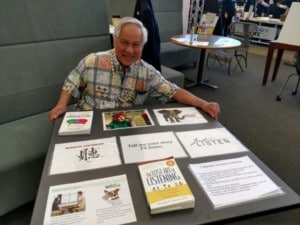By Dennis Wong, February 27, 2019, Published in Rotary International
Imagine yourself addressing conflicts through the lenses of fellowship, empathy, accountability and trust. That is the Four-Way Test. Imagine the power four questions and twenty-four words can have to help resolve conflicts without violence and fulfill our Rotary peace mission.
The Four-Way Test is Rotary’s unique approach and process to address conflicts, solve problems and make decisions to achieve desired outcomes. It can help us be more successful in reaching mutually beneficial, sustainable and scalable solutions.
The Four-Way Test has been a go-to for Rotary members when they have found themselves in difficult situations. With the Rotarian Code of Conduct, it is an ethical and effective guide for Rotary members to use for their personal and professional relationships. Furthermore, the concepts of conflict transformation embrace many of the Rotary principles. The Test is about fellowship, empathy, accountability and trust.

Dennis Wong is Co-Founder of the Rotarian Action Group for Peace.
Conflict transformation is the process to transform conflict into constructive change without violence. It differs from conflict resolution and conflict management approaches by recognizing “contemporary conflicts require more than the reframing of positions and identification of win-win outcomes. The very structure of parties and relationships may be embedded in a pattern of conflictual relationships that extend beyond the particular site of conflict. Conflict transformation is a process of engaging with and transforming the relationships, interests, discourses and, if necessary, the very constitution of society that supports the continuation of violent conflict.” *
The Four-Way Test is not a rigid process. Be creative and consider flipping the order of the four questions. Below are ideas for using The Four-Way Test and conflict transformation concepts for constructive change without violence.
- Will it build GOODWILL and BETTER FRIENDSHIPS? FELLOWSHIP. Rotarians are known for being sociable and building relationships. Ensure the process is civil and there’s a feeling of respect and openness to ask questions that can lead to creative and innovative solutions. Discuss and agree on desired outcomes.
- Will it BENEFICIAL to all concerned? EMPATHY. Have an open mind and a curiosity for new ideas, novel applications and different point-of views. Consider many options and build on different ideas. Come to mutually beneficial solutions that are sustainable and scalable.
- Is it FAIR to all concerned? ACCOUNTABILITY. Keep in mind both the Golden Rule and the Platinum Rule. Identify and include all interested and affected parties. Try to understand the other point-of-views in the context of conflict and reaching shared goals.
- Is it the TRUTH? TRUST. From the Rotarian Code of Conduct, act with integrity and high ethical standards. Acknowledge and define the problem including the root causes. Collect information and apply critical thinking by asking questions to identify the difference between facts, beliefs, assumptions and opinions. Moreover, be a trusted problem solver.
The Four-Way Test is an adaptive process. It takes into account everyone’s’ point-of-view and concerns, as well as their needs and wants. The process is designed to build goodwill and earn trust so a particular end result is mutually beneficial, sustainable and has scalable outcomes.
I encourage you to consider using The Four-Way Test to address conflicts or work towards conflict transformation in your community. Please contact me for more information, as well as your comments.

Leave A Comment
You must be logged in to post a comment.